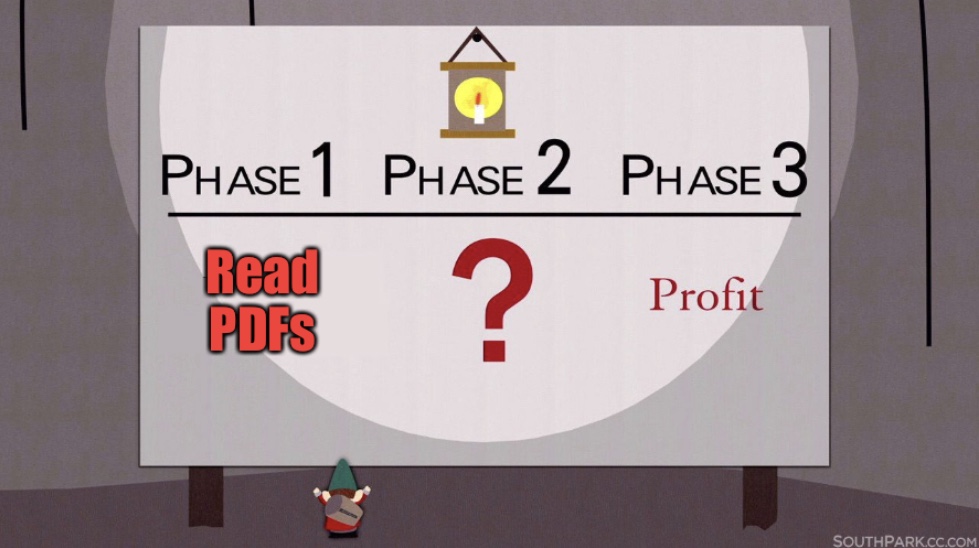There is a crisis in medicine, but not the one you think:
Reading primary literature is superior to press releases and tweets — it sounds so obvious, but not many physicians act on it. There no prizes to be won for not just following the KOLs, nor do you save any time. Quite the opposite: instead of a promoted tweet about the me-too drug de jour falling into your lap, you need to find a way to identify what’s worth your time reading, and also find time to actually read it — not a small achievement, as highlighted by the above tweets.
But then what? Sure, there is profit at the end of the rainbow in the form of useful knowledge, but merely reading a PDF may not result in any knowledge at all, let alone knowledge you can use. Or, as the underpants gnomes would put it:

I too had a backlog of unread PDFs once, spent so much time organizing files and folders, using this and that program to store the metadata, trying out plain paper, a Kindle, an iPad or two, thinking it is how I was reading them that mattered and oh if only I could find the perfect setting, under the shade of an old oak tree perhaps, with some peace and quiet, a pen in one hand and a cup of coffe in the other, well, then the unread pile would melt away and all would be good in the world.
But reading is easy, if what you read is useful, entertaining, or both. For most people without visual impairments or dyslexia, the log jam is at Step 2. We don’t want to read our pile of PDFs because, in most post-GME circumstances, there isn’t a clear goal to reading them (lest you have superhuman memory). This is particularly true early on in your carreer, when you have nothing to hang your hat on mentally, and few connections to make between what you are reading and what you already know. Sure, you don’t need to keep track of the articles you’ve read if the only reason for reading is to pan them on Twitter. You do, however, want to summarize what you’ve read and save it for future use, be it in a lecture, article, grant proposal or a blog post. So if and when you find a fairly obscure but potentially important fact about this or that cellular pathway in a supplemental figure from a CNS-adjacent journal, and you memorize the fact for later use, and then a year or so later you do use it to make a figure for the background section of a clinical trial protocol, well, what you do not want happening in that case is to spend hours of your life trying to retrace your steps and figure out the original source when a fellow asks where you got the data.
I wouldn’t be admitting to all that if I didn’t think I’ve found a solution. A few years ago, I replaced the unsustainable routine of just-in-time literature reviews for whatever I needed done with a robust knowledge management system — a GTD® for ideas, if you will. It got to a point where I can read at least one article every day and skim a few more, get the useful information out and into my app of choice, and have all the information I need to write an editorial like this in a morning or two.
As with most of the things I do it is too personal and Rube Goldberg-y to be of use to anyone else, but it started with a forum post and a book, and if you’d like to turn your plate full of PDFs into something more usable may I recommend that you start with one or both of those and see how it goes. Could it be any worse than what you’re doing now?
